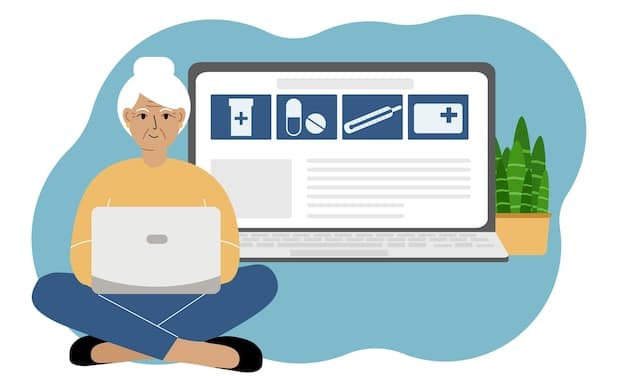Medicaid Expansion 2025: Are You Eligible for Low-Cost Healthcare?

Medicaid expansion in 2025 aims to provide affordable healthcare to more Americans; eligibility depends on income, household size, and state residency, with expanded programs offering comprehensive benefits.
Navigating the healthcare landscape can be challenging, especially when trying to find affordable options. With **Medicaid Expansion: Find Out If You Qualify for Free or Low-Cost Healthcare in 2025**, understanding your eligibility and accessing the benefits you deserve is more attainable than ever.
Understanding Medicaid Expansion
Medicaid expansion is a pivotal component of the Affordable Care Act (ACA), designed to extend healthcare coverage to a larger segment of the population. By increasing the income eligibility thresholds, more individuals and families can access free or low-cost healthcare services. This expansion primarily targets adults with incomes up to 138% of the federal poverty level.
The impact of Medicaid expansion is far-reaching, influencing not only individual health outcomes but also the overall healthcare system. Let’s delve deeper into what Medicaid expansion entails and how it benefits communities across the United States.
Key Provisions of Medicaid Expansion
Medicaid expansion involves several key provisions that make healthcare more accessible and affordable. These provisions include:
- Increased Income Eligibility: Raising the income threshold to 138% of the federal poverty level.
- Comprehensive Coverage: Providing a wide array of healthcare services, including preventive care, hospital visits, and mental health services.
- Federal Funding: The federal government covers a significant portion of the expansion costs, reducing the financial burden on states.
By implementing these provisions, Medicaid expansion aims to reduce the number of uninsured individuals and improve health outcomes for vulnerable populations.
In summary, Medicaid expansion broadens healthcare access by raising income eligibility, offering comprehensive benefits, and securing federal funding. This initiative significantly impacts individual health and the healthcare system at large.

Eligibility Criteria for Medicaid Expansion in 2025
Determining whether you qualify for Medicaid expansion in 2025 involves evaluating several factors. The primary criteria include your income, household size, and state of residence. Understanding these eligibility requirements is essential to navigating the application process successfully.
Different states have varying approaches to Medicaid expansion, which can influence the specific qualifications you need to meet. Here’s a closer look at the key considerations for eligibility.
Income Requirements
Income is a critical factor in determining Medicaid eligibility under the expansion. Generally, individuals with incomes up to 138% of the federal poverty level (FPL) may qualify. The specific income limits vary depending on your household size.
Household Size
Your household size also plays a significant role in determining Medicaid eligibility. Larger households have higher income limits to account for the increased financial needs. Consult the guidelines for your specific state to understand how household size affects your eligibility.
- Single Adults: Often need to have an income below a certain threshold, typically 138% of the FPL, to qualify.
- Families: Income limits increase with each additional family member.
- Children: Specific programs may offer coverage to children in families with higher incomes.
Ultimately, eligibility for Medicaid expansion in 2025 hinges on meeting specific income and household size criteria. Understanding these factors is crucial for a successful application.
How to Apply for Medicaid in Your State
Applying for Medicaid involves a straightforward process, although it can vary slightly depending on the state you reside in. Gathering the necessary documentation and understanding the application steps will help ensure a smooth experience.
Here are the general steps to follow when applying for Medicaid, along with tips to streamline the process.
Gathering Required Documents
Before you begin your application, gather all the necessary documents. This typically includes:
- Proof of Income: Pay stubs, W-2 forms, or tax returns.
- Identification: Driver’s license, state ID, or passport.
- Proof of Residency: Utility bills, lease agreements, or mortgage statements.
- Social Security Numbers: For all household members applying.
Having these documents readily available will expedite the application process.
To summarize, ensure you have all necessary documents like proof of income, identification, and residency before starting your Medicaid application. Being prepared can significantly streamline the process.

Benefits Covered Under Medicaid Expansion
Medicaid expansion offers a comprehensive range of healthcare benefits designed to improve the health and well-being of enrollees. These benefits often include preventive care, hospital services, and mental health support.
Understanding the scope of these benefits can help you make informed decisions about your healthcare needs and access appropriate services. Here’s an overview of the key benefits covered under Medicaid expansion.
Preventive Care Services
Preventive care is a cornerstone of Medicaid coverage, focusing on early detection and prevention of illnesses. Covered services may include:
Mental Health Services
Mental health services are an integral part of Medicaid expansion, recognizing the importance of mental well-being. These services can include:
- Counseling and Therapy: Individual and group therapy sessions.
- Psychiatric Evaluations: Assessments to diagnose and treat mental health conditions.
- Substance Abuse Treatment: Programs to address addiction and substance use disorders.
Medicaid expansion ensures access to mental health services, supporting individuals in managing their mental health needs effectively.
In essence, Medicaid expansion offers a comprehensive suite of benefits, including preventive care, hospital services, and mental health support, ensuring enrollees have access to essential healthcare services.
The Impact of Medicaid Expansion on States
Medicaid expansion not only affects individual health but also has significant implications for states. Expanding Medicaid can lead to improved health outcomes, economic benefits, and reduced uncompensated care costs.
Different states have experienced these impacts in various ways, depending on their specific implementation strategies and healthcare needs.
- Improved Health Outcomes: Increased access to preventive care and early treatment can lead to better health outcomes for residents.
- Economic Benefits: Medicaid expansion can stimulate the economy by creating jobs in the healthcare sector and reducing the financial burden on hospitals.
- Reduced Uncompensated Care Costs: By providing coverage to more individuals, Medicaid expansion can decrease the amount of uncompensated care that hospitals must absorb.
Medicaid expansion has multifaceted impacts on states, including improved health outcomes, economic stimulus, and reduced uncompensated care costs.
Common Misconceptions About Medicaid
There are several common misconceptions about Medicaid that often deter eligible individuals from applying. Addressing these myths with accurate information can help more people access the healthcare they need.
Let’s dispel some of the prevalent myths surrounding Medicaid and clarify the facts.
Myth: Medicaid is Only for the Unemployed
Reality: Medicaid eligibility is primarily based on income and household size, not employment status. Many employed individuals with low incomes may qualify for Medicaid coverage.
- Income-Based: Eligibility is determined by comparing your income to the federal poverty level.
- Working Individuals: Even if you have a job, you may still qualify if your income is below the threshold.
- Self-Employed: Income from self-employment is also considered when determining eligibility.
Medicaid eligibility is mainly determined by income and household size, making it accessible to both unemployed and employed individuals with low incomes.
| Key Point | Brief Description |
|---|---|
| ✅ Income Limits | Eligibility depends on income relative to the Federal Poverty Level. |
| 👨👩👧👦 Household Size | Larger households have different income limits for eligibility. |
| 🏥 Covered Benefits | Includes preventive, hospital, and mental health services. |
| 📝 Application | Gather necessary documents and apply through your state’s Medicaid agency. |
Frequently Asked Questions (FAQs)
▼
Medicaid expansion is a provision of the Affordable Care Act (ACA) that expands healthcare coverage to more low-income adults by raising the income eligibility threshold to 138% of the federal poverty level.
▼
Eligibility typically includes adults with incomes up to 138% of the federal poverty level. Specific requirements vary by state, including factors like household size and residency.
▼
Medicaid expansion covers a range of benefits, including preventive care, hospital services, mental health services, and substance abuse treatment. The exact offerings can vary by state.
▼
To apply, gather required documents like proof of income, identification, and residency, then contact your state’s Medicaid agency or visit their website for the application process.
▼
If your income is slightly above the Medicaid limit, you may still be eligible for subsidies through the Health Insurance Marketplace, which can help lower your monthly premiums and out-of-pocket costs.
Conclusion
Understanding Medicaid expansion is crucial for accessing affordable healthcare options in 2025. By familiarizing yourself with the eligibility criteria, application process, and covered benefits, you can take proactive steps to secure the healthcare you need and deserve. Stay informed about changes in your state’s Medicaid policies to ensure you’re maximizing your access to healthcare resources.





